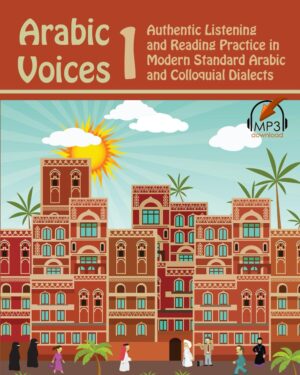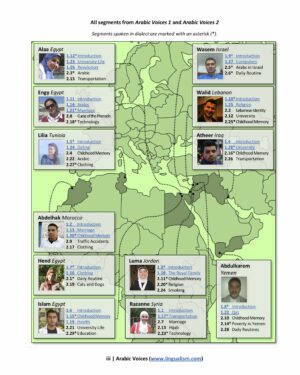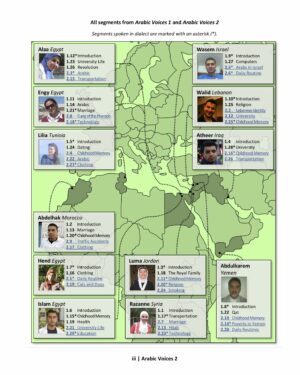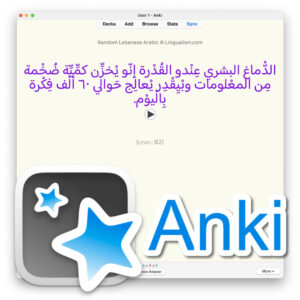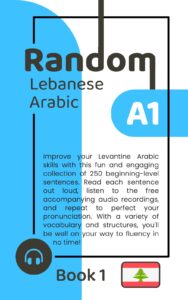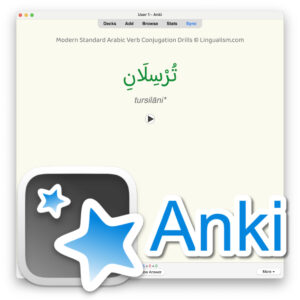Home » Modern Standard Arabic » University Life–Islam
University Life–Islam
| Greetings and welcome! [00:00.3] | السلام عليكم ورحمة الله وبركاته، أهلًا ومرحبًا بكم. | |
| In this video, we will talk about what Islam said about university life in Egypt, and we will comment on the different phrases and words he used. [00:04.9] | في هذا الفيديو سنتحدّث عمّا قاله إسلام بشأن الحياة الجامعية في مصر، وسنعلّق على ما استخدمه من عباراتٍ وكلماتٍ مختلفة. | |
| We start on page 118, specifically on line 2, where Islam says: (I would like to remind you that I am a university student in my second year at university). [00:15.6] | ونبدأ في الصفحة المائة وثمانية عشر، وتحديدًا في السطر الثاني، حيث يقول إسلام: (أحب أن أُذكّركم بأني طالبٌ جامعي في السنة الثانية لي في الجامعة). | |
| Islam here uses the verb [remind], and when using the verb [remind], we often use after this verb, or we always use after this verb the preposition بـ. [00:31.5] | ويستخدم إسلام هنا الفعل [يُذكّر]، وعند استخدام الفعل [يُذكّر]، غالبًا ما نستخدم بعد هذا الفعل، أو دائمًا ما نستخدم بعد هذا الفعل حرف [ الباء]. | |
| (Reminds him of something; I remind him to do his homework) using the preposition بـ, which is the opposite of the verb [remember] or [remember]. [00:45.0] | (يُذكّر بشيءٍ ما؛ أنا أُذكّره بأداء واجبه) باستخدام حرف [ الباء]، وهو على عكس الفعل [يَذكُر] أو [يَتذكَر]. | |
| You can say: (I remember doing this) or (I remember doing this, I remember doing the duty) or (I remember doing the duty," but when using the verb [remind], the preposition بـ must be used; (This reminds me of my childhood) or (So-and-so reminds me of my work," and so on. [00:58.0] | يمكنك أن تقول: (أنا أذكُر فعل هذا) أو (أتَذكَر فعل هذا، أتَذكَر القيام بالواجب) أو (أذكُر القيام بالواجب)، ولكن عند استخدام الفعل [يُذكّر]، فلابدّ من استخدام حرف [ الباء]؛ (فيُذكّرني هذا بطفولتي) أو (يُذكّرني فلان بعملي)، وهكذا. | |
| Great! We then move on to the line 12, And on line 12. Islam says: (I joined a university called Kafr El-Sheikh University). [01:22.7] | عظيم! ننتقل بعد ذلك إلى السطر الثاني عشر، وفي السطر الثاني عشر—يقول إسلام: (التحقت بإحدى الجامعات تُدعى جامعة كفر الشيخ). | |
| And here Islam uses the verb [attaqq], and when using the verb [attach], we also use the preposition بـ; [Join in], (Join a job, Join a job) means that this person has become part of a certain system, (Join a job, Join a job, Join a university). [01:37.9] | وهنا يستخدم إسلام الفعل [التحق]، وعند استخدام الفعل [التحق] كذلك نستخدم حرف [ الباء]؛ [التحق بـ]، (التحق بعمل، التحق بوظيفة) ويعني أن هذا الشخص أصبح جزء من نظام معين، (التحق بالعمل، التحق بوظيفة، التحق بجامعة). | |
| We often use the verb [enroll] with these words (to go to a university, go to a job, go to a job," and so on, and the preposition بـ must be used with this verb. [01:59.3] | غالبًا ما نستخدم الفعل [التحق] مع هذه الكلمات (يلتحق بجامعة، يلتحق بوظيفة، يلتحق بعمل)، وهكذا، ولابدّ من استخدام حرف [ الباء] مع هذا الفعل. | |
| Then we move to line 13, where Islam says: (Of course I was one of them," and here Islam uses the word [of course] to emphasize. [02:12.1] | بعد ذلك ننتقل إلى السطر الثالث عشر، حيث يقول إسلام: (وبالطبع كنت أحدهم)، وهنا يستخدم إسلام للتأكيد كلمة [وبالطبع]. | |
| You can also say: (And of course...and of course I was one of them) or (And of course I was one of them); [And of course, of course, of course] Three different words you can use for emphasis; [Of course, of course, of course] either one is true. [02:24.6] | ويمكنك كذلك أن تقول: (وطبعًا… وطبعًا كنت أحدهم) أو (وبالتأكيد كنت أحدهم)؛ [وبالطبع، وطبعًا، وبالتأكيد] ثلاث كلمات مختلفة يمكنك استخدامها للتأكيد؛ [وبالطبع، طبعًا، وبالتأكيد] أيًا منهما يكون صحيحًا. | |
| on line 17—Islam says: (Just as they all had the same feeling, the feeling of overwhelming joy," Islam here uses the verb [appears], and after the verb [appears] he uses [on him] or [them]. [02:46.2] | في السطر السابع عشر—يقول إسلام: (كما أنهم جميعًا كان يظهرعليهم نفس الشعور؛ شعور الفرحة العارمة)، يستخدم إسلام هنا الفعل [يظهر]، وبعد الفعل [يظهر] يستخدم [عليه] أو [عليهم]. | |
| You can also use to express the same thing. You can use [appear to them], you can say (they all felt the same) or (they seemed to feel the same," with the verb [appear] or [appear], and a word or letter [On]; [Shows it, looks it up]. [03:02.4] | ويمكنك أن تستخدم كذلك للتعبيرعن نفس الشيء يمكنك أن تستخدم [يبدو عليهم]، فيمكنك أن تقول (أنهم جميعا كان يظهر عليهم نفس الشعور) أو (يبدو عليهم نفس الشعور)، مع استخدام الفعل [يظهر] أو [يبدو]، وكلمة أو حرف [على]؛ [يظهر عليه، يبدو عليه]. | |
| We then move to line 23, where Islam says: (It takes another hour and a half to go home," and uses the verb [to take] with time. [03:30.1] | ننتقل بعد ذلك إلى السطر الثالث والعشرون، حيث يقول إسلام: (أستغرق ساعة ونصف أخرى حتى أعود إلى البيت)، ويستخدم الفعل [يستغرق] مع الوقت. | |
| We often use the verb [to take] with [time], for example: (the journey takes half an hour) or (the journey takes an hour," meaning any [takes time], (the journey takes half an hour, the journey takes half an hour) , and we often use the verb [to take] with… when talking about time. [03:43.2] | كثيرًا ما نستخدم الفعل [يستغرق] مع [الوقت]، تقول مثلًا: (الرحلة تستغرق نصف ساعة) أو (الرحلة تستغرق ساعة)، وهذا يعني أي [تأخذ من الوقت]، (الرحلة تأخذ من الوقت نصف ساعة، الرحلة تستغرق نصف ساعة)، وكثيرًا ما نستخدم الفعل [يستغرق] مع… عند التحدّث عن الوقت. | |
| Then we move on to line 28, where he says: (Unfortunately, I didn't get either of them). [04:09.6] | بعد ذلك ننتقل إلى السطر الثامن والعشرون، حيث يقول: (ومن سوء حظي أنني لم أحصل على أيٍ منهما). | |
| Islam here uses the phrase [and out of luck], and this phrase expresses [regret]. [04:18.8] | يستخدم إسلام هنا عبارة [ومن سوء حظي]، وهذه عبارة تعبر عن [الأسف]. | |
| And you can also say [Unfortunately, out of my misfortune, or out of misfortune], [04:27.0] | ويمكنك كذلك أن تقول [وللأسف، ومن سوء حظي، أو ومن سوء الحظ]، | |
| or you could say [unfortunately]; In this phrase, you can say: (Unfortunately, I did not get either of them). [04:33.0] | أو يمكنك أن تقول [وللأسف]؛ ففي هذه العبارة يمكنك أن تقول: (وللأسف أنني لم أحصل على أيٍ منهما). | |
| You can say: (Unfortunately I didn't get the… I didn't get the grant, or unfortunately I didn't get the grant) Either way is correct to express regret, or unlucky for you. [04:40.8] | يمكنك أن تقول: (من سوء الحظ أنا لم أحصل عن… أنا لم أحصل على المنحة، أو للأسف أنا لم أحصل على المنحة) أيٍ منهما صحيح للتعبير عن الأسف، أو عدم محالفة الحظ لك. | |
| Great! We then move on to line 30. Islam says: (I share with some of my friends in renting external housing near the university). [04:58.0] | عظيم! ننتقل بعد ذلك إلى السطر الثلاثون. يقول إسلام: (أنا أشترك مع بعض أصدقائي في تأجير سكن خارجي بالقرب من الجامعة). | |
| And here, excuse me… We then move on to line 30, where Islam says: (In the beginning, in the first semester, I had to share with some of my friends in renting an external accommodation). [05:12.0] | وهنا عفوًا… ننتقل بعد ذلك إلى السطر الثلاثون، حيث يقول إسلام: (فاضطررت في البداية في أول فصل دراسي أن أشترك مع بعض أصدقائي في تأجير سكن خارجي). | |
| And Islam here uses the verb [compelled], and when using the verb [compelled], you can append it [to the infinitive source], meaning that and the present verb; (I had to travel, I had to do something.) [05:32.0] | ويستخدم إسلام هنا الفعل [يضطر]، وعند استخدام الفعل [يضطر]، يمكنك أن تلحقه [بالمصدر المؤول] أي أن والفعل المضارع؛ (اضطررت أن أسافر، اضطررت أن أقوم بعمل أمر ما). | |
| You can also use the verb [compelled] with [the infinitive], but it is necessary before using [the infinitive] with the verb [compelled] to use [to], to say (I had to travel); [05:49.7] | كما يمكنك أن تستخدم الفعل [يضطر] مع [المصدر الصريح]، ولكن لابدّ قبل استخدام [المصدر الصريح] مع الفعل [اضطر] أن تستخدم [إلى]، فتقول (اضطررت إلى السفر)؛ | |
| The explicit source of travel must be preceded by a to when using the verb [compelled]; (I had to do this," and [to] should be used here with [explicit source]. [06:08.4] | المصدر الصريح السفر لابدّ من سبقه بإلى عند استخدام الفعل [يضطر]؛ (اضطررت إلى القيام بأداء هذا الفعل)، ولابدّ من استخدام [إلى] هنا مع [المصدر الصريح]. | |
| But if you want to use [authoritative source] you don't have to use 'I had to travel, I had to go to this place', and so on. [06:25.9] | ولكن إذا أردت أن تستخدم [مصدر مؤول] فلا عليك أن تستخدم إلى تقول (اضطررت أن أسافر، اضطررت أن أذهب إلى هذا المكان)، وهكذا. | |
| Then we move on to the next sentence on line 31—Islam says: (And how do you know what external housing is! And how do you know what external housing is!). [06:36.2] | ننتقل بعد ذلك إلى الجملة التالية في السطر الواحد والثلاثون—يقول إسلام: (وما أدراك ما السكن الخارجي! وما أدراك ما السكن الخارجي!). | |
| Here, Islam uses a rhetorical form, which is [what do you know], this phrase is to exaggerate something, or to show that an order what is serious, or is something that means more than you expect. [06:50.4] | هنا يستخدم إسلام صيغة بلاغية وهي [وما أدراك]، هذه العبارة هي للمبالغة في أمرٍ ما، أو لإظهار أن أمر ما هو أمر جد، أو أنه أمر يعني أكثر مما تتوقع. | |
| You say, for example: (Travel and what makes you know what travel is!) If you say what makes you travel, that is, travel is for him… For example, it has many obstacles and you face many things when you travel, and so on. [07:09.8] | تقول مثلًا: (السفر وما أدراك ما السفر!) إذا قلت وما أدراك ما السفر أي أن السفر له… مثلًا له عقبات كثيرة وأنت تواجه أشياء كثيرة عندما تسافر، وهكذا. | |
| (How do you know what travel is!) That is, there are many things related to this travel and this matter is complicated, and this phrase may be used to say that something is much better than you might imagine, or that something is much worse than you might imagine. [07:26.3] | (وما أدراك ما السفر!) أي أن هناك أمور كثيرة متعلّقة بهذا السفر وهذا الأمر معقد، وقد تُستخدم هذه العبارة للقول بأن أمرًا هو أفضل بكثير مما قد تتخيل، أو أن أمر أسوأ بكثير مما قد تتخيل. | |
| You say, for example: (Travel, and what do you know about travel!) That is, if you say in… when you hear this… when you say this phrase if you seem sad or so, then this means that… you express lots of travel related problems. [07:46.9] | فتقول مثلًا: (السفر وما أدراك ما السفر!) أي إذا قلت في… عندما تسمع هذا… عندما تقول هذه العبارة إن كنت يبدو عليك أنك حزين أو كذا، فهذا يعني أن… أنك تعبر عن مشاكل كثيرة متعلّقة بالسفر. | |
| And if you say (travel, and what makes you know what travel is!," then if you seem happy, then this means that travel has many benefits, and for him and you, this means that a person becomes happy when he travels, and so on; (And how do you know what that is). [08:05.5] | وإن قلت (السفر وما أدراك ما السفر!)، فإذا كنت يبدو عليك السعادة، فهذا يعني أن السفر له فوائد كثيرة، وله وأنت يعني… هذا يعني أن الشخص يصبح سعيد عندما يسافر، وهكذا؛ (وما أدراك ما كذا). | |
| You say, for example: (The vacation and what makes you know what the vacation is!) or (The trip, and you know what the trip is!). [08:26.3] | تقول مثلًا: (الإجازة وما أدراك ما الإجازة!) أو (الرحلة وما أدراك ما الرحلة!). | |
| When you say (How do you know what a trip is!) you might mean something negative, that is, it was an unpleasant trip at all; Or that the trip was so happy when you say (the trip, what a trip!). [08:35.3] | فعندما تقول (وما أدراك ما الرحلة!) قد تعني أمر سلبي، أي أنها كانت رحلة غير سارة على الإطلاق؛ أو أن الرحلة كانت سعيدة جدًا عندما تقول (الرحلة وما أدراك ما الرحلة!). | |
| Here, Islam uses the phrase [what do you know] with a negative meaning, that is, there are many negative things related to external housing, and how do you know what external housing is! [08:49.8] | هنا يستخدم إسلام عبارة [وما أدراك] بمعنّا سلبي أي أن هناك أشياء سلبية كثيرة متعلّقة بالسكن الخارجي وما أدراك ما السكن الخارجي! | |
| We then move on to line 34, where Islam says, "It was a tough class." [09:04.9] | ننتقل بعد ذلك إلى السطر الرابع والثلاثون، حيث يقول إسلام (لقد كان فصلًا دراسيًا عصيبًا). | |
| And the word [difficult] means [difficult], it means [tired], it means [strained]; You can use [difficult], you can use [tired], you can use [tired]; [difficult] means [hard] or [difficult], [strained], [tired]; All of these words can be used in place of [difficult] if you want to express the same thing. [09:13.8] | وكلمة [عصيبًا] تعني [صعبًا]، تعني [متعبًا]، تعني [مجهدًا]؛ يمكنك أن تستخدم [صعبًا]، يمكنك أن تستخدم [مجهدًا]، يمكنك أن تستخدم [متعبًا]؛ [عصيبًا] بمعنى [شاقًا] أو [صعبًا]، [مجهدًا]، [متعبًا]؛ كل هذه الكلمات يمكنك أن تستخدمها بدلًا من [عصيبًا] إذا أردت التعبير عن نفس الشيء. | |
| On line 38, Islam says: (I don't need anything but my personal stuff). [09:36.9] | في السطر الثامن والثلاثون—يقول إسلام: (ولا أحتاج إلى أي شيءٍ غير أغراضي الشخصية). | |
| Islam here uses the verb [needs], and when using the verb [needs]—as you know—we use [to] with it. [09:46.0] | ويستخدم إسلام هنا الفعل [يحتاج]، وعند استخدام الفعل [يحتاج]—كما تعرف—نستخدم [إلى] معه. | |
| She says: (So-and-so needs something, I need food, I need to go to the library," and so on, [to] must be used with the verb [need]. [09:54.4] | تقول: (يحتاج فلان إلى شيءٍ ما، أحتاج إلى الطعام، أحتاج إلى الذهاب إلى المكتبة)، وهكذا، فلابدّ من استخدام [إلى] مع الفعل [يحتاج]. | |
| Finally, we comment on what Islam said on line 40, where he says: (This is not the complete story, but I hope it has caught your attention). [10:08.8] | أخيرًا نعلّق على ما قاله إسلام في السطر الأربع… الأربعون، حيث يقول: (تلك ليست القصة كاملة لكن أتمنى أن تكون قد أثارت انتباهكم). | |
| This phrase we use often, and we use with the verb [attention] we use the verb [raised]. In fact, we use the verb [to provoke] or [to provoke] with more than one expression related to thinking. [10:21.5] | وهذه العبارة نستخدمها كثيرًا، ونستخدم مع الفعل [انتباه] نستخدم معه الفعل [أثار]. وفي الحقيقة نستخدم الفعل [أثار] أو [يثير] مع أكثر من عبارة تتعلّق بالتفكير. | |
| For example, you say: (I hope this caught your attention," or you can also say: (Something surprising," meaning that a person becomes amazed when he sees it, or you can say: (Thinking, this thing makes a person think) a lot about this. [10:35.2] | تقول مثلًا: (أتمنى أن يكون هذا قد أثار انتباهكم)، أو يمكنك أن تقول كذلك: (شيئًا ما يثير الدهشة) أي أن شخص يصبح مُدهَشًا عندما يراه، أو يمكنك أن تقول: (يثير التفكير، فهذا الشيء يثير التفكير) يجعل الإنسان يفكر كثيرًا في هذا الأمر. | |
| You can say: (This verb surprised me, this book made me think, this situation caught my attention) that is, I became aware of it, as you can see the verb [raised] is used with many expressions that relate to thinking. [10:58.7] | يمكنك أن تقول: (هذا الفعل أثار دهشتي، هذا الكتاب أثار تفكيري، هذا الموقف أثار انتباهي) أي أصبحت منتبهًا إليه، فكما ترى الفعل [أثار] يستخدم مع كثير من العبارات التي تتعلّق بالتفكير. | |
| I hope this video sparked your thinking, and thank you very much. [11:16.6] | أتمنى أن يكون هذا الفيديو قد أثار تفكيركم، وأشكركم شكرًا جزيلًا. | |
| Meet you well in another video, and may the peace, mercy and blessings of God be upon you. [11:22.8] | ألقاكم على خير في فيديو آخر، والسلام عليكم ورحمة الله وبركاته. |
Video Lessons
Arabic Voices MSA Lessons
Arabic teacher Mostafa Ahmed takes us through segments in MSA from Lingualism's book Arabic Voices 1: Authentic Listening and Reading Practice in Modern Standard Arabic and Colloquial Dialects, explaining interesting points of grammar and vocabulary.
© 2024 Lingualism LLC

